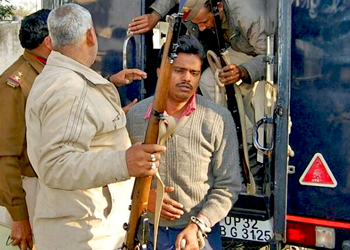Allahabad, Jan 28: The death sentence of Surender Koli, convicted in 2006 Nithari serial killings case, was today commuted to life imprisonment by the Allahabad High Court on the ground of "inordinate delay" in deciding his mercy petition.

A Division Bench comprising chief justice D Y Chandrachud and Justice P K S Baghel held that execution of Koli's death sentence would be "unconstitutional in view of the inordinate delay" in deciding his mercy petition.
The order came on a Public Interest Litigation filed by NGO People's Union for Democratic Rights (PUDR) which contended that the period elapsed in disposal of Koli's mercy petition was "3 years and 3 months" and, as such, execution of death sentence would be in violation of the Right to Life granted in Article 21 of the Constitution.
A petition filed later by Koli himself, challenging the death sentence on the same ground as the one stated in the PIL, has also been clubbed with it.
The death sentence was awarded to him by a special CBI court at Ghaziabad on February 13, 2009. The PIL was filed on October 31 last year, three days after the Supreme Court rejected Koli's recall application. The death warrant issued by the trial court on September 2 had fixed September 12 as the date of hanging, though its execution was stayed in view of the apex court's decision to hear the recall application. Rejection of the recall application had cleared the decks for execution of the death sentence, but it was stayed by the High Court on October 31 when it decided to hear the PIL.
After his appeal against the trial court order was turned down by High Court on September 11, 2009 while co-accused and his employer Moninder Singh Pandher was acquitted, Koli filed a petition before the Supreme Court challenging his conviction which was dismissed on February 15, 2011.
Koli, thereafter filed his mercy petition before the Governor of Uttar Pradesh on May 7, 2011, which was rejected 23 months later, on April 2, 2013. The mercy petition was thereafter forwarded to the Union Home Ministry on July 19, 2013 and it was turned down by the President on July 20, 2014.
The court had agreed to hear the PIL disagreeing with the Centre's preliminary objection that "the convict (Koli) had not filed a petition (at the time of filing of the PIL) challenging the rejection of his mercy petition". "The proceeding which has been instituted before this court is not in the nature of an appeal on merits against the order of conviction. "The petition seeks to question the constitutionality of the execution of the sentence of death in the present case, on the ground of a delay on the part of constitutional authorities in disposing of the mercy petitions," the court had said.
Pandher and his domestic help Koli were arrested on December 29, 2006, after the police recovered skeletons and other belongings of missing girls from the drain outside his house in Noida on the outskirts of the national capital. Koli had allegedly killed several girls, chopping their bodies to pieces before throwing them in the backyard and in the drain.





Comments
Add new comment